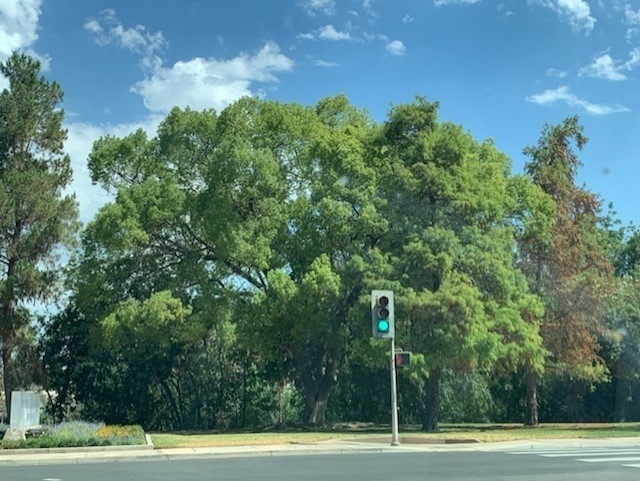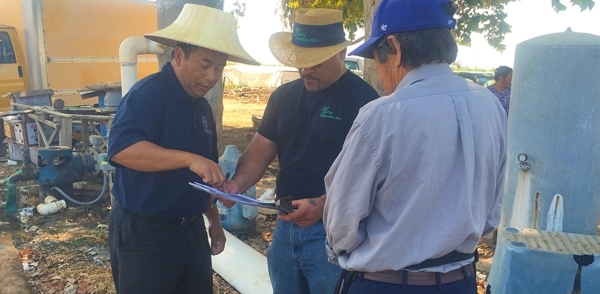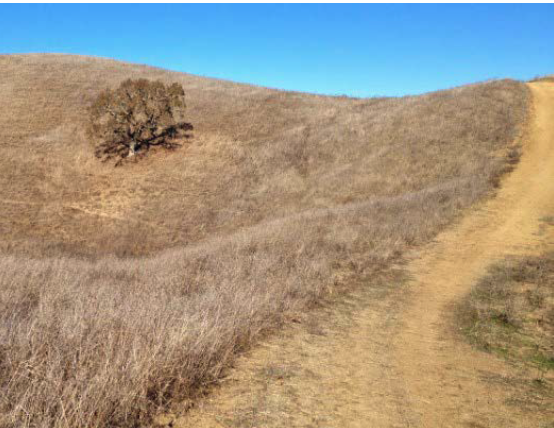Posts Tagged: risk
Lawn-pocalypse! Surviving Drought
Ah, summer! The season of sunburns, pool parties, and… lawn droughts. If your once lush, green carpet now looks like a crunchy brown doormat, you're not alone. Let's dive into why your yard is staging a dramatic death scene and what you can do to...

Bermuda grass and weeds overtaking drought stressed turf grass.
Chris Jakober named Risk and Safety Director
Chris Jakober has joined UC ANR as Director of Risk & Safety Services. In this role, Chris will lead ANR's programs and teams for Environmental Health & Safety and Risk Management, reporting to Director of Facilities Planning and Management Brian Oatman.
Chris completed his bachelor's degree in chemistry at Oklahoma State University, where he studied land application of wastewater treatment residuals for nitrogen and phosphorus runoff mitigation and an in-vitro procedure to determine bioavailability of heavy metals from ingestion of contaminated soils. In 2001, further educational pursuits brought him to California, where he completed his doctoral work at UC Davis in agricultural and environmental chemistry, measuring carbonyls in motor vehicle exhaust.
His professional experiences include air-quality consulting on novel dust mitigation at Owens Lake for Los Angeles Department of Water and Power, air quality research for the California Air Resources Board (e.g. regulating ozone emissions from indoor air cleaners, area source greenhouse-gas emissions verification, and health exposure risk assessment for environmental justice communities), and environmental health and safety in support of research at UC Davis.
Chris is based at the UC ANR building in Davis and can be reached at cjakober@ucanr.edu and (530) 756-1046.
Please join me in welcoming him.
Brian Oatman
Director, Facilities Planning & Management
Climate-Change Resources
University of California UC ANR Green Blog (Climate Change and Other Topics) https://ucanr.edu/blogs/Green/index.cfm?tagname=climate%20change (full index)
Examples:
- Save Trees First: Tips to Keep Them Alive Under Drought https://ucanr.edu/b/~CdD
- Landscaping with Fire Exposure in Mind: https://ucanr.edu/b/~G4D
- Cities in California Inland Areas Must Make Street Tree Changes to adapt to Future Climate https://ucanr.edu/b/~oF7
Drought, Climate Change and California Water Management Ted Grantham, UC Cooperative Extension specialist (23 minutes) https://youtu.be/dlimj75Wn9Q
Climate Variability and Change: Trends and Impacts on CA Agriculture Tapan Pathak, UC Cooperative Extension specialist (24 minutes) https://youtu.be/bIHI0yqqQJc
California Institute for Water Resources (links to blogs, talks, podcasts, water experts, etc.) https://ciwr.ucanr.edu/California_Drought_Expertise/
UC ANR Wildfire Resources (publications, videos, etc.) https://ucanr.edu/News/For_the_media/Press_kits/Wildfire/ (main website)
-UC ANR Fire Resources and Information https://ucanr.edu/sites/fire/ (main website)
-Preparing Home Landscaping https://ucanr.edu/sites/fire/Prepare/Landscaping/
UC ANR Free Publications https://anrcatalog.ucanr.edu/ (main website)
- Benefits of Plants to Humans and Urban Ecosystems: https://anrcatalog.ucanr.edu/pdf/8726.pdf
-Keeping Plants Alive Under Drought and Water Restrictions (English version) https://anrcatalog.ucanr.edu/pdf/8553.pdf
(Spanish version) https://anrcatalog.ucanr.edu/pdf/8628.pdf
- Use of Graywater in Urban Landscapes https://anrcatalog.ucanr.edu/pdf/8536.pdf
- Sustainable Landscaping in California https://anrcatalog.ucanr.edu/pdf/8504.pdf
Other (Non-UC) Climate Change Resources
Urban Forests and Climate Change. Urban forests play an important role in climate change mitigation and adaptation. Active stewardship of a community's forestry assets can strengthen local resilience to climate change while creating more sustainable and desirable places to live. https://www.fs.usda.gov/ccrc/topics/urban-forests
Examining the Viability of Planting Trees to Mitigate Climate Change (plausible at the forest level) https://climate.nasa.gov/news/2927/examining-the-viability-of-planting-trees-to-help-mitigate-climate-change/
Reports and other information resources coordinated under the auspices of the United Nations and produced through the collaboration of thousands of international scientists to provide a clear and up to date view of the current state of scientific knowledge relevant to climate change. United Nations Climate Action
Scientific reports, programs, action movements and events related to climate change. National Center for Atmospheric Research (National Science Foundation)
Find useful reports, program information and other documents resulting from federally funded research and development into the behavior of the atmosphere and related physical, biological and social systems. Search and find climate data from prehistory through to an hour ago in the world's largest climate data archive. (Formerly the "Climatic Data Center") National Centers for Environmental Information (NOAA)
Think tank providing information, analysis, policy and solution development for addressing climate change and energy issues (formerly known as the: "Pew Center on Global Climate Change"). Center for Climate & Energy Solutions (C2ES)
Mapping Resilience: A Blueprint for Thriving in the Face of Climate Disaster. The Climate Adaptation Knowledge Exchange (CAKE) was launched in July 2010 and is managed by EcoAdapt, a non-profit with a singular mission: to create a robust future in the face of climate change by bringing together diverse players to reshape planning and management in response to rapid climate change. https://www.cakex.org/documents/mapping-resilience-blueprint-thriving-face-climate-disaster
Cal-Adapt provides a way to explore peer-reviewed data that portrays how climate change might affect California at the state and local level. We make this data available through downloads, visualizations, and the Cal-Adapt API for your research, outreach, and adaptation planning needs. Cal-Adapt is a collaboration between state agency funding programs, university and private sector researchers https://cal-adapt.org/
Find reports, maps, data and other resources produced through a confederation of the research arms of 13 Federal departments and agencies that carry out research and develop and maintain capabilities that support the Nation's response to global change. Global Change (U.S. Global Change Research Program)
The Pacific Institute is a global water think tank that combines science-based thought leadership with active outreach to influence local, national, and international efforts to develop sustainable water policies. https://pacinst.org/our-approach/
Making equity real in climate adaptation and community resilience policies and programs: a guidebook. https://greenlining.org/publications/2019/making-equity-real-in-climate-adaption-and-community-resilience-policies-and-programs-a-guidebook/
Quarterly CA Climate Updates and CA Drought Monitor Maps (updated each Thursday) https://www.drought.gov/documents/quarterly-climate-impacts-and-outlook-western-region-june-2022
Drought focus of Water Resources IMPACT magazine special issue
UC ANR experts address emotional toll of drought
Preparing the American West for prolonged drought is the focus of a double issue of Water Resources IMPACT magazine. The California Water Commission staff are guest editors for this special open-access edition of the magazine, which is published by the American Water Resources Association.
Faith Kearns, academic coordinator of University of California Agriculture and Natural Resources' California Institute for Water Resources, is among the authors delving into how drought impacts people and the environment and how we can better prepare for the inevitable.
The first issue, published on Feb. 14, focuses on water scarcity issues confronting California and the ways these issues affect different sectors.
In “Trauma, Care, and Solidarity: Addressing the Emotional Toll of Chronic Drought,” Kearns highlights the effects of drought on mental health. She points to the spike in suicide hotline calls when wells ran dry in Southeast Asian communities in California's Central Valley.
By listening to Southeast Asian farmers, Ruth Dahlquist-Willard and Michael Yang of UC Cooperative Extension were able to “lighten the load” for them by providing pragmatic support, Kearns writes.
“The scale of some of these highly emotional issues – drought, wildfires, climate change – can make them seem incredibly difficult, if not impossible, to deal with,” Kearns said. “At the same time, they are affecting everyone living in the western U.S. on a daily basis. I wanted to highlight and provide models based on work that people – whether they are researchers, clinical psychologists, or Cooperative Extension advisors – are doing right now to ease the way.”
The authors who contributed to the double issue are a diverse array of Tribal experts, academics, nongovernmental organization thought-leaders, water managers and water policy influencers, each of whom brings their own perspective on the topic of drought. Their expertise and perspectives in climate science, water policy and water management will help inform drought-related decision-making and support policies that better prepare the state to thrive during periods of prolonged water scarcity.
In addition to Kearns, the first issue includes articles contributed by:
- Samantha Stevenson, University of California, Santa Barbara
- Jay Lund, University of California, Davis
- Ron Goode, North Fork Mono Tribe
- Andy Fecko, Placer County Water Agency
- Jeff Mount, Public Policy Institute of California, and Ted Grantham, University of California, Berkeley/UC Cooperative Extension
- Nat Seavy and Karyn Stockdale, National Audubon Society
- Kjia Rivers, Community Water Center
- Cannon Michael, Bowles Farming
- Michelle Reimers, Turlock Irrigation District
The January/February edition of Water Resources IMPACT magazine can be accessed, free of charge, on the American Water Resources Association website at https://www.awra.org under “Publications.”
The second issue, to be published in March, will focus on drought response, considering the options for adaptation. This two-part series complements the Commission's work on strategies to protect communities and fish and wildlife in the event of a long-term drought.
UCCE seeks statewide input to develop future wildfire programs
University of California Cooperative Extension has recently expanded their team of fire advisors and staff. This new group of UCCE fire professionals is interested in learning about the concerns of the communities that UCCE serves, as well as the natural resource professionals already working to address these issues.
Results from this survey will enhance the team's ability to partner with residents, landowners, agencies, academics, and other organizations to reduce California's vulnerability to wildfires. These new advisors will also share survey results with UCCE colleagues throughout the state, who already provide important fire-related programming across diverse landscapes and audiences.
"Wildfires will continue to affect all Californians, either directly or indirectly," said Katie Low, UCCE statewide fire coordinator. "It's invaluable to have the input of as many people as possible to guide the development of our wildfire-related extension programs, so that they can provide the most useful resources and information to communities across California."
The survey asks questions about topics such as:
- Gaps within existing educational programming and resources
- Challenges community members are facing in addressing wildfire risk
- Empowerment of communities to make property management decisions and prepare for wildfire
- Acceptability of prescribed fire and other fuels treatments
By participating in this study, you can choose to enter a drawing to win one of fifty $20 VISA gift cards.
To take the online survey, please visit https://bit.ly/UCCE_Fire_Survey.
This research is being led by a team of new UCCE fire advisors and staff. If you have any questions about this survey, please contact the fire/forestry professionals involved in this survey effort:
- Luca Carmignani, UCCE fire advisor for Los Angeles, Orange, Riverside, and San Diego counties, carmignani@ucanr.edu
- Alison Deak, UCCE fire advisor for Fresno, Madera, and Mariposa counties, aldeak@ucanr.edu
- Katie Low, UCCE fire academic coordinator for Nevada and Placer counties, katlow@ucanr.edu
- Barb Satink Wolfson, UCCE fire advisor for Monterey, San Benito, Santa Clara, and Santa Cruz counties, bsatinkwolfson@ucanr.edu
- Ryan Tompkins, UCCE forestry advisor for Plumas, Sierra, and Lassen counties, retompkins@ucanr.edu
For more information about wildfire-related programming from University of California Cooperative Extension, please visit https://ucanr.edu/sites/fire/ or the Facebook page https://bit.ly/fireSolutions.




